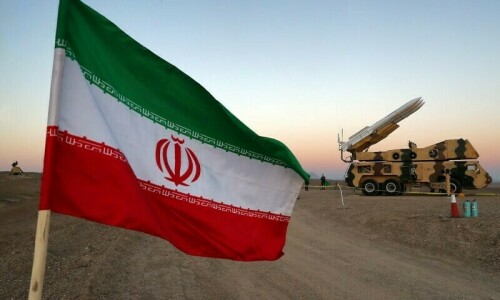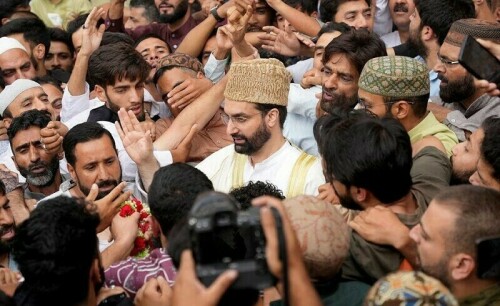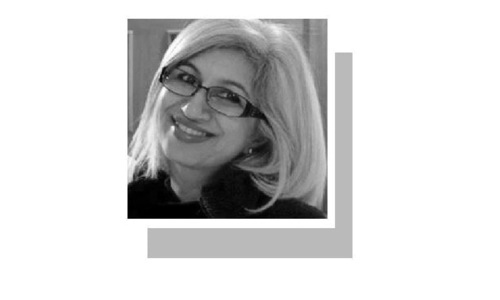The novel opens on the day before the Eid holiday and is set over the course of one day (with interludes into the past of each character) as the three brothers — Aman Erum, Hayat and Sikandar — decide to visit separate mosques because “it is too dangerous, too risky, to place all the family together in one mosque.”
Each one of the three brothers has made different life choices since the death of their father, Inayat, who had warned his youngest, Hayat, that they would have to pay for their choices. Inayat, who belonged to a generation of men from Mir Ali that had fought for decades against the treacheries of the state, had told his son that “each and every member of the household will know that pain is of no consequence when fighting for the collective.” As the story unfolds with an almost thriller-like skillfulness, Hayat rides out of the town on his motorbike.
The eldest, Aman Erum, takes a taxi to the local mosque while Sikandar — married to Mina, who frequents funerals of unknown people in the town — drives to the hospital where he works as a doctor. There is a curious sense of melancholy that weighs on the three men and the women in their lives — and as they venture further into their day, we connect their past relationships to the present, moving effortlessly between the past and then the near future with a mystery that sustains until the end.
Aman Erum has returned to Mir Ali after spending years in America where as a young man hoping to study and make something of his future, he left behind his firebrand sweetheart, Samarra, and his young brothers. When past memories of Samarra, his father’s stories of fighting for Mir Ali in the 1950s, and his childhood desperation to travel to America return enroute to the mosque that morning, we understand why this novel is so important for its colossal thematic inquiries. As a human story of the politics of a volatile region that is brutally destroying (or has already destroyed) its young men and women, the ghosts of the past hold significance. To move towards your future you have to conquer the past, is what the writer seems to be saying at most instances.
Betrayal, allegiances, family ties and resilience come head-to-head with love, liberalism, progression and changing ideology. Years previously, a younger and nervous Aman Erum in his “bespoke polyester suit” had travelled to the American embassy in Islamabad to apply for his visa. He had never worn a suit before this interview but he wanted to look dapper and, of course, be seen in a suit. When he is asked at the interview what he thinks of 9/11 and the fall of the Taliban, his rehearsed answer would have been: “two aeroplanes hit foreign buildings, this is what people in Mir Ali heard. What they knew about this new war, what they understood about the events that turned their town into a battlefield once more, was this: those planes were flown by heroes.” It is then that he realises the answers inculcated in him are not the ones his host country is looking for. Years later, when he becomes an informant for the state and loses what was important to him as a young idealist, he realises that he has paid a high price for his American visa.
His youngest brother Hayat does not leave the environs of Mir Ali but joins a movement targeting the state, “moving weapons, even heavy artillery, under the eyes of the military.” A Shia separatist, a senior underground operator, he works alongside firebrand students, radical professors, and other fellow cadres who meet at the local university. Many disappear when picked up by the military police who claim that these men are aligned with Al Qaeda. Hayat befriends the fascinating Samarra, taken in by her courage, she having drifted from the eldest brother to forge a bond with the youngest. Samarra is one of those young people who have nothing to lose, boldly coordinating their latest operation to assassinate the visiting chief minister. “It will change the situation,” Samarra explains. “It will be too large an assault. They will have to reconfigure everything.” Bhutto writes about how injustice, generations of disappearances and violent torture by state authorities change young people with no hope for a better life. Samarra is picked up, interrogated, tortured and scarred by the authorities.
Bhutto’s skill as a political fiction writer allows her to create an intelligent story of lost identity, political apathy and war. Contemporary political novels — Mirza Waheed’s The Collaborator, Hari Kunzru’s My Revolutions, and John Updike’s The Terrorist — address violent conflict through fiction and the pervasive role of governments and extremist organisations. Bhutto smartens her fiction by using her characters and their stories to explore the souring relationship between Pakistan and America and its implications at the height of the ‘war on terror’; she criticises the government’s perception and treatment of a young, lost generation from the tribal belt, those who suffered and were pulled into a war they never understood. As Samarra says to the officer who beats her during her incarceration, accusing her of being a rebel and traitor: “You are the ones who have sold everything in this country you defend so urgently. You sold its gold, its oil, its coal, its harbours,” even its airspace.
Women are the heartbeat of this novel; they are extraordinary for their spirit and strength of heart and mind in a region where their voices are impermissible. Mina, in all her madness, remains the most interesting for her understanding of the changes that they must grapple with being Shia and anti-Taliban in Mir Ali.
While accompanying her husband, Sikandar, in his hospital van, they are accosted by Talibs with wispy beards and light-blue turbans, and it is Mina who has the strength to stand up to them. In an outburst so full of rage and pain that it shocks the Talib commander, she accuses them of injustice. “These men are students of justice. They can be accused of being violent, of being rash, of anything but injustice,” writes Bhutto. But Mina yells her guts out, pointing to their unjust ways of killing until her voice is hoarse. Mina does all of this as Sikandar is viciously beaten and, with a Kalashnikov aimed at his head, made to answer the life-or-death question: “Are you Sunni or Shia?”
As a writer and poet from Pakistan’s most famous political dynasty, Bhutto is often criticised by her literary detractors for writing about a country and people that she has (lately) had little time to explore and understand. I would disagree because her fictional debut, even with its structural shortcomings, is an ambitious project with strong-willed women (and men), memorable scenes written with emotional depth, and the clever use of suspense as a tool.
Other writers might have used a similar backdrop and storyline with greater literary merit, but Bhutto’s work and focus is developing. If her memoir, Songs of Blood and Sword, was about the bloody family history she knows only too well, this novel is no exception because it explores the impact of the ‘war on terror’, including drone strikes and innocent casualties, in Pakistan’s tribal belt. How one is forced to sacrifice comes through the novel’s five characters in an important story of young people who collaborate and fight power because they have few other choices. These young people question where and why everything has gone wrong in Pakistan. At one point, one of the characters is trapped by the ghosts of history: something we know too well as the tragedy of Pakistan.
The Shadow of the Crescent Moon
(Novel)
By Fatima Bhutto
Penguin Books, India
ISBN 9780670085705
232pp.















































